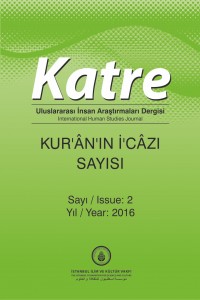Abstract
Öz
Kelimeler, cümlelerin ham maddeleridir. Kelimelerle konuşur, yazar ve anlaşırız. İnsanı
kendine muhatap seçen Yüce Yaratıcı da bizlere kelimelerle hitap etmekte, onların
dillerini, kültür ve anlayış seviyelerini dikkate almaktadır. Gerek Kur’an’da, gerekse diğer
ilahi kitaplarda insana olan hitap, hep kelimelerledir. Kelimeler, kâh pencere olur bize
öteleri gösterir, kâh rehber olup elimizden tutar, bizi çok ötelere seyahat ettirir. Belagat
imamlarından Abdülkahir Cürcanî, Kur’an’ın nazmına dikkat çekerek “Onun mucizeliğinin
asıl burada aranması gerektiğini” nazara verir. Bunu “nazım nazariyesi” ile ortaya
koyar. Cürcanî’ye göre “belagat nazımdadır, tek başına kelimede veya mücerret manada
değildir.” Bediüzzaman Said Nursi, Cürcanî’nin bu nazariyesini İşârâtü’l-İ’câz isimli
tefsirinde Fatiha Suresini ve Bakara Suresinin başında yer alan otuz üç âyeti uygulamalı
olarak okuyucuyla paylaşır.
Abstract
Words are the raw materials of the sentences which they form. We speak with words,
write with them, and make agreements through them. The Supreme Creator is One who
chooses to answer and address us as humans, and He does this through the medium of
words that take into consideration the varying languages, cultures and degrees of intellectual
comprehension amongst humanity. No other holy book addresses humanity with
all the words as revealed in the Qur’an. The words are like the windows of a lofty palace
which allow us to see the view through it, and such a palace is a guide which befriends
us and drives us to participate in great and lofty journeys. Abdulkahir Curcani, a leading
scholar dealing with the issue of eloquent rhetoric, observes the composition of the Qur’an
and states that “The essence of its miraculousness must be sought here”. He sets forth a
“theory of poetics” pertaining to it. According to Curcani “Eloquence is found in poetic
verse, and not in solitary words or in abstract meaning”. Bediuzzaman Said Nursi practically
demonstrates and shares with the reader a similar theory to that of Curcani in his
work “Signs of Miraculousness” - which provides exegesis of thirty three verses from
Surah Fatiha and Bakara pertaining to this topic.
References
- BEYDAVİ, Kadı, Envaru’t- Tenzil ve Esraru’t- Te’vil, Ter. Şadi Eren, Işık Yay. İst.
Abstract
Abstract
Words are the raw materials of the sentences which they form. We speak with words,
write with them, and make agreements through them. The Supreme Creator is One who
chooses to answer and address us as humans, and He does this through the medium of
words that take into consideration the varying languages, cultures and degrees of intellectual
comprehension amongst humanity. No other holy book addresses humanity with
all the words as revealed in the Qur’an. The words are like the windows of a lofty palace
which allow us to see the view through it, and such a palace is a guide which befriends
us and drives us to participate in great and lofty journeys. Abdulkahir Curcani, a leading
scholar dealing with the issue of eloquent rhetoric, observes the composition of the Qur’an
and states that “The essence of its miraculousness must be sought here”. He sets forth a
“theory of poetics” pertaining to it. According to Curcani “Eloquence is found in poetic
verse, and not in solitary words or in abstract meaning”. Bediuzzaman Said Nursi practically
demonstrates and shares with the reader a similar theory to that of Curcani in his
work “Signs of Miraculousness” - which provides exegesis of thirty three verses from
Surah Fatiha and Bakara pertaining to this topic.
References
- BEYDAVİ, Kadı, Envaru’t- Tenzil ve Esraru’t- Te’vil, Ter. Şadi Eren, Işık Yay. İst.
Details
| Primary Language | Turkish |
|---|---|
| Journal Section | Refereed Articles |
| Authors | |
| Publication Date | September 6, 2016 |
| Submission Date | February 23, 2017 |
| Published in Issue | Year 2016 Issue: 2 |

Katre International Human Studies Journal is open access journal under the CC BY-NC license (Creative Commons Attribution 4.0 International License)
Based on a work at https://dergipark.org.tr/en/pub/katre
E-mail: katre@iikv.org

